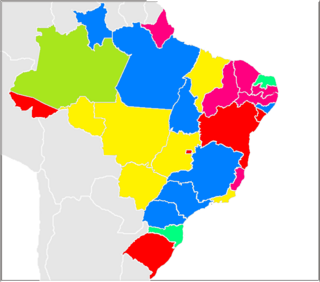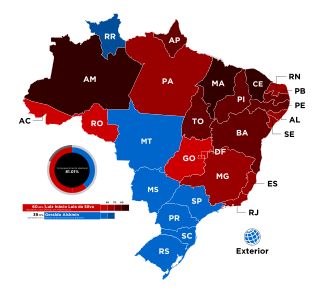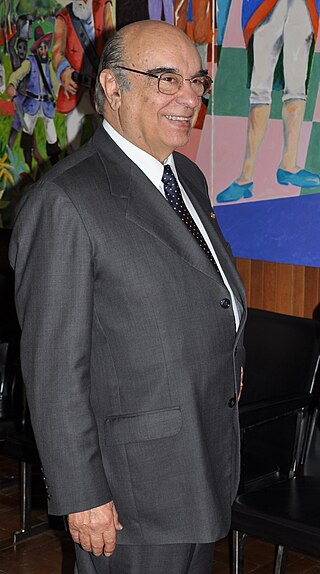
The Workers' Party is a centre-left political party in Brazil that is currently the country's ruling party. Some scholars classify its ideology in the 21st century as social democracy, with the party shifting from a broadly socialist ideology in the 1990s, although the party retains a left-wing and marginal far-left faction to this day. Founded in 1980, PT governed at the federal level in a coalition government with several other parties from 1 January 2003 to 31 August 2016. After the 2002 parliamentary election, PT became the largest party in the Chamber of Deputies and the largest in the Federal Senate for the first time. With the highest approval rating in the history of the country at one time, President Luiz Inácio Lula da Silva was PT's most prominent member. Dilma Rousseff, also a member of PT, was elected twice but did not finish her second term due to her impeachment in 2016. The party came back to power with Lula's victory in the 2022 presidential election.

The Socialism and Liberty Party is a left-wing political party in Brazil. The party describes itself as socialist and democratic.

Geraldo José Rodrigues Alckmin Filho is a Brazilian physician and politician currently serving as 26th vice president of Brazil. He previously was the Governor of São Paulo for two nonconsecutive terms, the longest serving since democratization, 2001 to 2006 and 2011 to 2018.

The Republicans, formerly the Brazilian Republican Party and originally formed as the Municipalist Renewal Party, is a Brazilian political party. Its electoral number, the numerical assignment for Brazilian political parties, is 10.

The history of the territory that is now Roraima, a state at the extreme north of present-day Brazil is recent, but not thereby simple. Invaded numerous times by the various countries interested in the region, the seldom-visited Roraima aroused little interest on the part of the Portuguese, especially after the arrival of the royal family in Rio de Janeiro. Meanwhile, the territory became coveted by other countries, including England, the Netherlands, and, especially, Spain.

General elections were held in Brazil on 6 October 2002, with a second round of the presidential election on 27 October. The elections were held in the midst of an economic crisis that began in the second term of the incumbent president, Fernando Henrique Cardoso of the centre-right Brazilian Social Democracy Party (PSDB). Due to constitutional term limits, Cardoso was ineligible to run for a third consecutive term.

The 2010 Brazilian gubernatorial elections were held on Sunday, October 3, as part of the country's general election. In these elections, all 26 Brazilian states and the Federal District governorships were up for election. When none of the candidates received more than a half of the valid votes in a given state, a run-off was held on October 24, 2010 between the two candidates with the most votes. According to the Federal Constitution, Governors are elected directly to a four-year term, with a limit of two terms. Eleven governors were prohibited from seeking re-election.

General elections were held in Brazil on 1 October 2006 to elect the president, National Congress and state governors, with a second round of the presidential election on 29 October as no candidate received more than 50% of the vote in the first round.

The 2010 Santa Catarina gubernatorial election was held on October 3, as part of the general elections in Brazil. Raimundo Colombo of the Democrats was elected as governor. One of the losing candidates, Ideli Salvatti, was chosen by president Dilma Rousseff to assume the Ministry of Fishing and Aquaculture.

Presidential elections were held in Portugal on 24 January 2016. The election chose the successor to the President Aníbal Cavaco Silva, who was constitutionally not allowed to run for a third consecutive term.

Events in the year 2010 in Brazil.

Events in the year 2009 in Brazil.

Events in the year 1993 in Brazil.

General elections were held in Brazil on 7 October 2018 to elect the president, National Congress and state governors. As no candidate in the presidential election received more than 50% of the vote in the first round, a runoff round was held of those offices on 28 October. On that day, right-wing outsider candidate Jair Bolsonaro defeated leftist Fernando Haddad and was elected President of Brazil.

The 2018 São Paulo gubernatorial election occurred on 7 October 2018 and 28 October 2018. Voters elected a Governor, Vice Governor, 2 Senators, 70 representatives for the Chamber of Deputies, and 94 Legislative Assembly members. The former governor, Márcio França, affiliated to the Brazilian Socialist Party (PSB) took office with the resignation of Geraldo Alckmin on 6 April 2018, and was eligible for a second term and ran for reelection.

General elections were held in Brazil on 2 October 2022 to elect the president, vice president, the National Congress, the governors, vice governors, and legislative assemblies of all federative units, and the district council of Fernando de Noronha. As no candidate for president received more than half of the valid votes in the first round, a runoff election for these offices was held on 30 October. Luiz Inácio Lula da Silva received the majority of the votes in the second round and was elected President of Brazil for a third, non-consecutive term.

Presidential elections were held in Cape Verde on 17 October 2021. The result was a victory for José Maria Neves of the opposition African Party for the Independence of Cape Verde (PAICV), who received 51.8% of the vote.

Bonifácio José Tamm de Andrada was a Brazilian politician affiliated to Democrats (DEM), law academic, university professor, political scientist and journalist.

The Brazil Union is a liberal-conservative political party in Brazil. The party was founded on 6 October 2021 through the merger of the Democrats (DEM) and the Social Liberal Party (PSL). The merger resulted in the biggest party in Brazil, and was approved by Brazil's Superior Electoral Court on 8 February 2022.
General elections will be held in Brazil on 4 October 2026 to elect the president, vice president, members of the National Congress, the governors, vice governors, and legislative assemblies of all federative units, and the district council of Fernando de Noronha. If no candidate for president or governor receives a majority of the valid votes in the first round, a runoff election is held on 25 October.


















